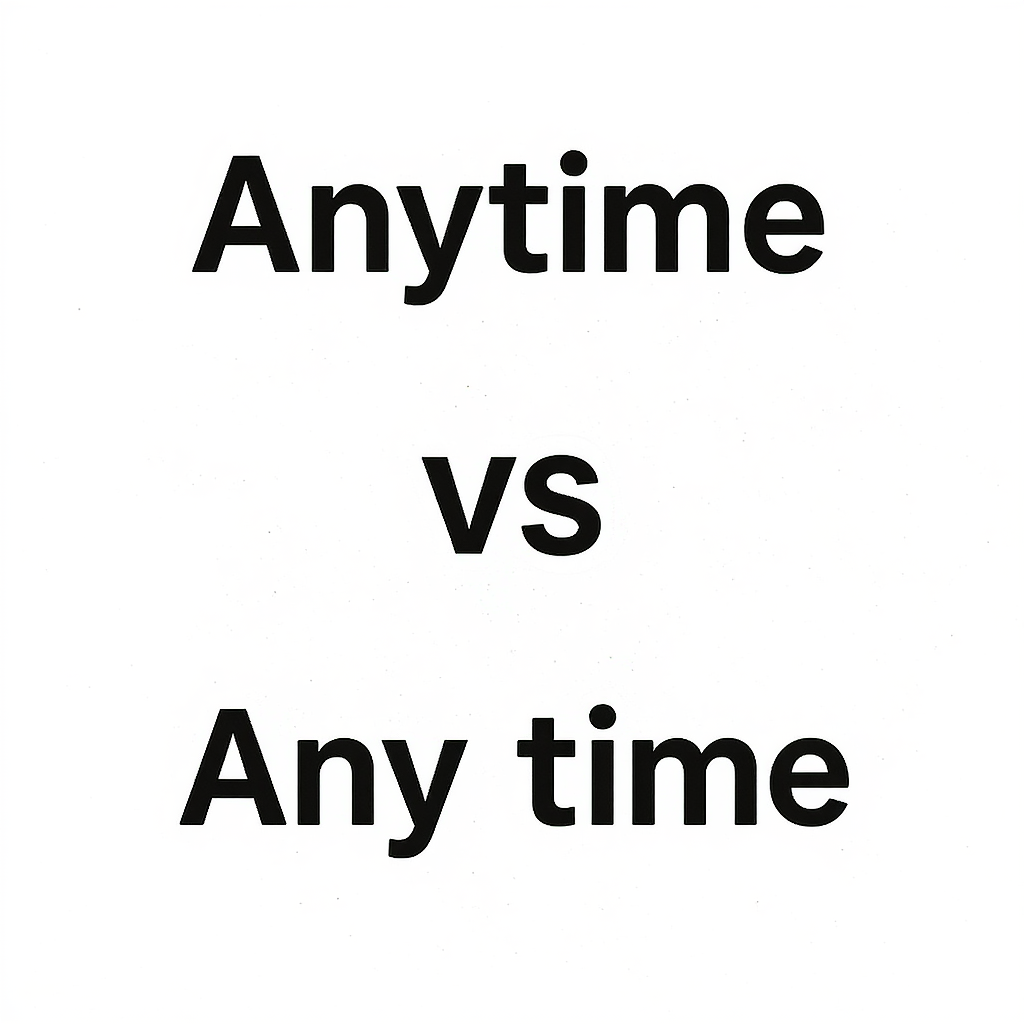"Anytime" Vs "Any Time" - What’s the Difference?

English is full of little pairs that seem identical until you look closely. One of the most common is “anytime” vs “any time.”
They look almost the same, but the space between the words actually changes the meaning. Today, Midoo AI will break it down with easy rules, plenty of examples, and memory tricks so you’ll always know which one to use.
What Does “Anytime” Mean?
Anytime (one word) is usually an adverb. It means “whenever” or “at any moment.” You can often replace it with whenever in a sentence, and the meaning stays the same.
Examples of “Anytime”:
- You can call me anytime.
- Stop by anytime you want.
- That song makes me smile anytime I hear it.
- She’s welcome to visit anytime.
- The system may update anytime.
👉 If you mean “whenever” or “at some moment,” use anytime.
What Does “Any Time” Mean?
Any time (two words) is a noun phrase that means “any amount of time.” It refers to time as a thing — like hours, minutes, or availability.
Examples of “Any Time”:
- Do you have any time to help me today?
- He didn’t spend any time studying.
- I don’t have any time for games.
- We didn’t get any time to rest.
- She didn’t waste any time finishing her project.
👉 If you’re talking about time itself, like hours or availability, use any time.
Quick Comparison
- Anytime = whenever
- Any time = any amount of time
Comparison Table
| Form | Part of Speech | Meaning | Example |
|---|---|---|---|
| Anytime | Adverb | Whenever / at any moment | You can visit anytime. |
| Any time | Noun phrase | Any amount of time / availability | Do you have any time tomorrow? |
Memory Tricks
- If you can replace it with whenever, use anytime (one word).
- If you’re literally talking about time as a thing, use any time (two words).
- Think: Adverb = anytime (one word). Noun = any time (two words).
Common Mistakes
❌ Do you have anytime to talk? ✔️ Do you have any time to talk?
❌ You can visit any time you like. (technically not wrong, but less common) ✔️ You can visit anytime you like.
FAQs
Is “anytime” always correct in casual English?
In everyday speech, many people use anytime more often, but in formal writing, make sure to use any time when you mean “an amount of time.”
Can I use “any time” instead of “anytime”?
Sometimes, yes. For example: “You can visit any time” is acceptable, though anytime is smoother.
Which one is more formal?
Any time (two words) feels more formal and is safer in academic or business writing.
Why does American English prefer “anytime”?
Because American English often merges common word pairs into single words when used as adverbs (like “anymore” vs “any more”).
What about British English?
Both forms exist in British English too, but any time (two words) is often more common in formal contexts.
Final Thoughts
The difference between anytime and any time is simple once you know the trick:
- Use anytime when you mean “whenever.”
- Use any time when you mean “any amount of time.”
Midoo AI suggests this practice: Try swapping the word with whenever. If it makes sense, write anytime. If not, use any time.